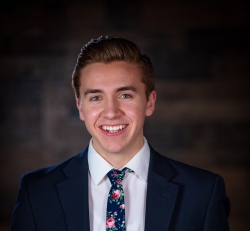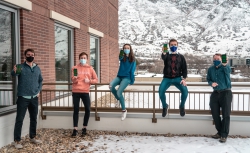Doing Good Better Through Science and Social Innovation
PROVO, Utah – Apr 28, 2021 – In a world still reeling from a global pandemic, many are wondering how to prevent or prepare for the next global disease outbreak. BYU microbiology major Curtis Hoffmann discovered what he believes is the answer through his work with the Ballard Center for Social Impact.
Hoffmann, a senior from Orem, first heard about the Ballard Center at the BYU Marriott School of Business while reading a microbiology and molecular biology email newsletter. The newsletter mentioned something that caught his eye: the center’s Social Innovation Projects (SIP), an on-campus internship class. After learning more about the program and what the Ballard Center offered, Hoffmann knew he needed to sign up and get involved.
After enrolling in the SIP class, Hoffmann was assigned to work with the Academy for Creating Enterprise (ACE). Hoffmann describes ACE as a nonprofit that teaches business principles in eight different countries around the world and tries to bring people out of generational poverty.
The project with ACE opened Hoffmann’s eyes to the possibility of connecting science with social innovation. Though he had participated in previous projects that combined the two fields to a certain extent, Hoffmann hopes to take it a step further in the research he will do in the future.
Part of Hoffmann’s journey to understanding how to help prepare for the next global pandemic came as a result of being enrolled in MSB 375 – Social Innovation: Do Good Better, a course offered through the Ballard Center. This class was another step for Hoffmann in learning how to get involved in social innovation. “Using principles the professors taught me in the SIP and Do Good Better classes, I am working to bridge gaps in science and business. In every step of the way, I am ‘Doing Good, Better’, because of what the Ballard Center has so keenly integrated into me,” Hoffmann says.
The COVID-19 pandemic brought a unique opportunity for Hoffmann to put the principles he had learned from the Ballard Center into practice on BYU campus. During the Winter 2021 semester, Hoffmann, with the help of BYU’s microbiology and molecular biology and public health departments, connected with Operation Outbreak to bring a virtual outbreak simulation to BYU campus.
Operation Outbreak is an education and simulation platform designed to help educate students about what happens during a viral disease outbreak. The program was first started after the Ebola crisis in 2016 and was developed with the help of Harvard University and the Broad Institute at Massachusetts Institute of Technology. Hoffmann founded the BYU Operation Outbreak student association in connection with the parent platform Operation Outbreak to change public health education in Utah.
Hoffmann developed his interest in disease outbreaks during his time in SIP. His experiences helping underserved populations through ACE prompted him recognize the disconnect between scientists, public health officials, and the general public. "Recently, with viruses going ‘viral’ because of COVID-19, worries about healthcare, global health, and security are at the forefront of people’s minds,” Hoffmann says. Scientists have always shared their findings on these topics, Hoffmann explains, but he thinks more could be done to effectively communicate important scientific insights to the public.
Hoffmann believes that the principles of social innovation taught by BYU Marriott are not only crucial to building bridges between science and business but also in helping train and teach the next generation of leaders. If people can work together in a spirit of solidarity, he says, a viral outbreak such as COVID-19 won’t reach pandemic proportions again.
With his new outlook on business and social innovation, Hoffmann hopes he can be a catalyst for positive change in the field of science. By using social innovation to create better solutions, he will focus on how his research can change lives. “The Ballard Center converted me to a new way of thinking. Now I don’t think just about bench side science but about becoming a scientist who also cares about people's health and livelihood.”
Media Contact: Chad Little (801) 422-1512
Writer: Veronica Maciel





